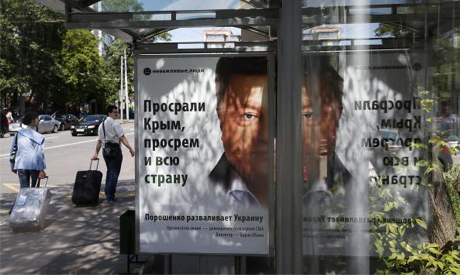
People walk past an advertising board showing an image of Ukraine's President Petro Poroshenko at a public transport station in central Moscow, June 30, 2014 (Photo: Reuters)
Ukraine stayed silent on extending a tenuous ceasefire in the conflict-hit east as a deadline slipped by despite frantic talks involving the leaders of Russia, France and Germany.
The truce between Kiev and the pro-Russian rebels in Ukraine's east ran until 1900 GMT on Monday but violence has rumbled on regardless with no end in sight to months of fighting that has claimed some 450 lives.
Both Moscow and Europe have been pushing for the ceasefire to be extended, arguing that it is a vital first step towards ending the fighting.
Ukraine's President Petro Poroshenko and Russian counterpart Vladimir Putin agreed to work on "the adoption of an agreement on a bilateral ceasefire" following four-way phone talks with Francois Hollande and Angela Merkel, the French presidency said.
But Kiev remained silent on a possible extension, saying only that all sides agreed that a new bilateral ceasefire should be discussed at a fresh round of "consultations" involving an OSCE envoy, a Russian diplomat and former Ukrainian leader Leonid Kuchma.
The statement from Kiev pointed out however that elements of recent agreements struck between the four heads of state had not been "respected", without giving details.
For its part, the Kremlin backed new indirect talks and said Putin had "stressed the importance of extending a ceasefire", to be monitored by international observers.
Prior to Monday's teleconference -- the second in two days between the four leaders -- Hollande and Merkel reiterated a European Union warning of more sanctions against Moscow unless Putin explicitly pressured pro-Kremlin rebels to stop fighting.
Broader sanctions could cut off whole sectors of the Russian economy from the EU's 500 million consumers, pushing it into recession with the International Monetary Fund already warning of negligible growth.
Moscow and Kiev said the foreign ministers from the four countries would hold urgent consultations to discuss the next steps.
There was no immediate reaction from the separatists but a senior rebel official told Russia's Interfax news agency earlier Monday that they could take part in a fresh round of indirect talks on Tuesday.
Two previous rounds of talks have proved inconclusive but did help spur the rebels into releasing eight international observers held hostage for around a month.
In the talks between the four leaders some headway appeared to be made on the contentious issue of shoring up Ukraine's porous border with Russia, through which Kiev accuses Moscow of sending fighters and weapons.
President Putin was "ready to authorise Ukrainian border guards access to Russian territory" to help monitor the leaky frontier, Steffen Seibert, a spokesman for Merkel said.
But so far on the ground the 10 days of truce has done little to stem the violence with both sides accusing each other of carrying on firing.
On Monday Russian state TV station Channel One said that its cameraman Anatoly Klyan, 68, died after being shot in the stomach by Ukrainian troops while on an overnight reporting trip with insurgents at a military base near the rebel-controlled city of Donetsk.
Russia's foreign ministry said the death showed that Ukrainian forces "clearly do not want a de-escalation in the armed conflict in the east."
Meanwhile, Ukrainian forces said that attacks by the insurgents over the weekend killed five of its soldiers.
Poroshenko is coming under growing public pressure to launch a full-scale assault, with some 500 people protesting against the ceasefire outside his office on Sunday.
The Western-backed leader refuses to meet rebel commanders who have "blood on their hands" and has suggested he may restart large-scale military operations if the rebels refuse to disarm.
Separatist chiefs say they will not engage in direct negotiations with Kiev until government forces withdraw from the heavily Russified east.
Over the past few days the rebels have tightened their grip in the region by forcing a string of pro-government military bases around Donetsk to surrender.
Last week Poroshenko put his name to a historic trade deal with Europe that ruptured Kiev's historic ties with Moscow.
Kiev and its Western allies accuse Russia of both arming and funding the militias in a bid to unsettle the new Ukrainian government as revenge for the February ouster of a pro-Kremlin president who had ditched the very EU agreement Poroshenko signed on Friday.
Russian and EU ministers have tentatively agreed to meet on July 11 to discuss Moscow's concerns over the EU agreement with Kiev.
Short link: